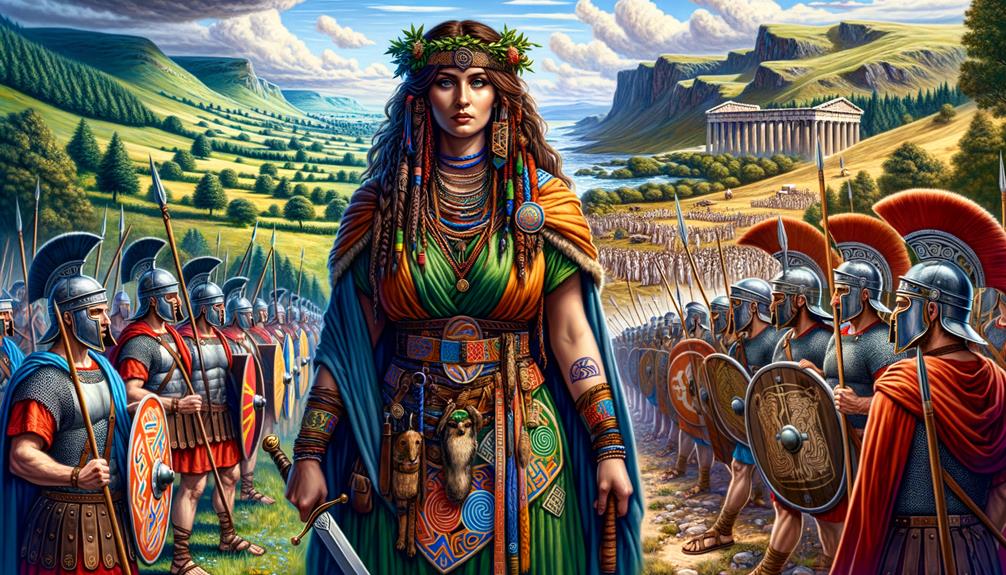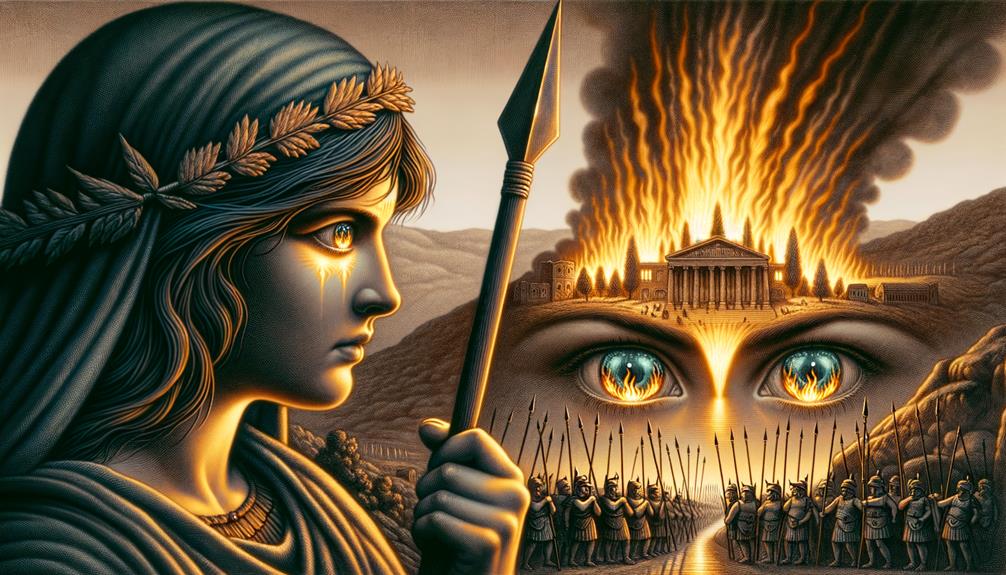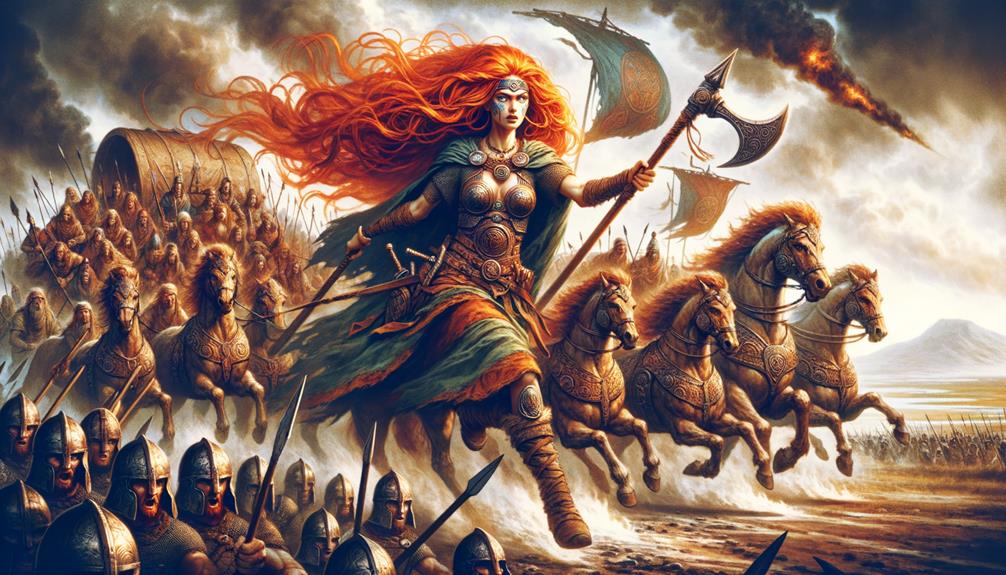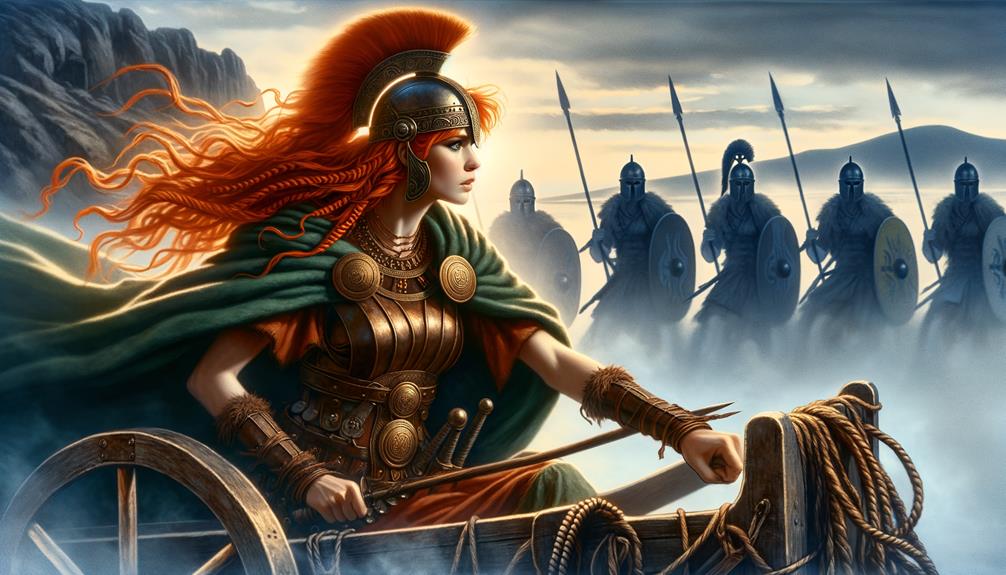Boudica, a strong-willed queen of the Iceni tribe, spurred an unmatched rebellion against Rome. When the Romans disregarded her family's rights and her husband's last wishes, she didn't sit idle. Instead, she took the charge of rebellion into her own hands. From Norfolk to Cambridgeshire and further, she brought tribes together, taking a strong stand against Roman rule. Her struggle was not just for territory, but for a sense of shared dignity and freedom. Although the rebellion came to a halt with the Battle of Watling Street, Boudica's tale has echoed through the ages, inspiring those with a defiant spirit. To fully understand the impact of Boudica's actions on history, we need to peel back the layers of her dramatic and turbulent story.
Boudicas Royal Background
Boudica is often remembered for her fierce uprising against the Romans. Yet, to fully grasp the depth of her courage and her motivations, it's vital to delve into her royal background. She was not just a queen but the wife of King Prasutagus of the Iceni tribe, standing tall and proud with her long, tawny hair and a voice that commanded attention. Her royal bloodline was just as influential as her physical characteristics, but it didn't shield her from the heavy hand of Roman rule.
The Romans violated her family's rights, a move that sparked Boudica's rebellious spirit. After the death of Prasutagus, he left his kingdom to his two daughters and the Roman Emperor Nero. However, the Romans snubbed his last wishes. This blatant disrespect, along with the forceful incorporation of the Iceni kingdom into Britannia, underscored the Romans' disrespect for their rights and self-rule.
But the Romans didn't stop there. Boudica and her daughters suffered further humiliation by the Roman centurions. This brutal mistreatment served as the spark that ignited her revolt. Therefore, Boudica was more than a rebel. She was a woman wronged, a queen defending the rights of her people, her daughters, and herself.
The Iceni Tribe and Roman Britain

Let's take a trip back in time to the days of ancient Britain, where the Iceni tribe held sway in areas like Norfolk, Cambridgeshire, Suffolk, and Lincolnshire. They were known for their firm stand against the oppressive actions of the Romans. Under the leadership of Prasutagus, life for the Iceni tribe was relatively peaceful, until his demise.
When Prasutagus passed away, things took a turn for the worse. The Romans, disregarding Prasutagus's wishes, seized the Iceni lands, completely disrespecting the tribe's rights and customs.
Amidst such harsh conditions, a courageous figure stepped up. Boudica, the queen and wife of Prasutagus, stood strong and unwavering. She was a personification of the Iceni's spirit of resistance – a spirit that would spark an uprising against the Roman rule. Boudica was spurred on not just by the disregard for her husband's will, but her motivations were deeper. She longed for freedom, a sentiment that resonated with the tribe of Iceni.
Boudica led the Iceni to form a formidable force, a tangible representation of their collective will to resist. This wasn't just an army, it was a symbol of rebellion, a testament to their unyielding determination. The Iceni's fight against Roman Britain wasn't just about land or power, they were fighting for dignity, freedom, and respect.
Provocation and Initiation of Rebellion

Boudica's story is one of rebellion ignited by gross mistreatment. It all began when her husband, Prasutagus, passed away. The Romans turned a blind eye to Prasutagus' last wishes, causing them to seize the lands that belonged to the Iceni. This action led to the public humiliation of Boudica's family.
But the rebellion Boudica led wasn't a knee-jerk reaction. It was a meticulously planned response to the Romans' oppressive actions and their blatant disrespect for Iceni independence. The Romans' harsh actions, which included publicly flogging Boudica and violating her daughters, stoked the fires of rebellion.
Let's look at the cause and effect:
| Reason for Provocation | Reaction |
|---|---|
| Disregard for Prasutagus' wishes | Land grab |
| Public humiliation of Boudica's family | Start of rebellion |
| Public flogging of Boudica | Heightened anger |
| Violation of daughters' dignity | Unification of British tribes |
Boudica's uprising unified various British tribes against the harsh rule of the Romans. This marked the beginning of a significant revolt in AD 60/61. Her tale serves as a symbol of the strength of a provoked spirit and stands as a testament to the courage to defy oppressors. The magnitude of her rebellion still echoes in history, a testament to her indomitable spirit.
Conquests and Battles of Boudica

Boudica's story of rebellion against the Romans is an exciting part of our history. Leading the Iceni and other British tribes, she fought back against Roman rule, taking over key settlements like Camulodunum and Londinium. Boudica's army grew to a whopping 230,000, showing us just how magnetic she was as a leader and how determined the British tribes were to resist Roman conquest.
The Roman governor, Suetonius, had his hands full dealing with this rebellion as it was a real threat to Rome's control over Britain. But everything changed at the Battle of Watling Street. Despite being heavily outnumbered, the Romans used their superior discipline and tactics to defeat Boudica's rebellion in a crucial clash. Even though they were up against a larger force, the Romans managed to deliver a fierce defeat to the Iceni queen and her followers.
This event had a significant impact and led to changes in how Rome governed. Even though the Romans had won, the memory of Boudica's rebellion was a clear reminder of British resistance to Roman conquest. To this day, we remember Boudica's unyielding spirit and the compelling story of her uprising against Rome AD. Her defiance continues to inspire, reminding us of the enduring power of resistance.
Legacy and Representation of Boudica

Boudica's legacy has been influential and enduring, particularly getting a boost during the Victorian age and becoming a rallying point for rebellion and women's rights. During the Victorian era, her popularity soared as her story of defiance was captured in various art forms such as poems, paintings, and statues.
| Victorian Era: Artistic Revival | Suffragettes: Symbol of Rebellion |
|---|---|
| Boudica's story was kept alive through poems, paintings, and statues. | Boudica was a key inspiration for the Suffragettes. |
| Museums have sections devoted to her life and revolt. | Her spirit of rebellion and empowerment continues to inspire. |
But Boudica's influence wasn't just cultural. She also had a significant historical impact. Her revolt was so powerful that it made Nero consider leaving Britain. This resulted in increased Roman activities in the region. This blend of cultural, historical, and political influence highlights Boudica's lasting importance.
Therefore, Boudica's legacy is more than just a story of rebellion. It is a testament to the unstoppable spirit of resistance and the strength of women's empowerment.
Frequently Asked Questions
What Was the Relationship Between Boudicca's Husband and the Roman Officials?
The relationship between Prasutagus and the Roman officials was far from harmonious. He experienced quite a bit of pushback from them. They completely ignored his last wishes, took over his assets, and didn't show any respect to his family. This led to a major uprising, a revolt against the harsh Roman regime.
Is Britannia Based on Boudica?
Certainly, Boudica is a figure who is frequently linked with Britannia. The way she boldly stood up against the Romans has become a powerful representation of the tenacity of the British people. Many different forms of art and literature portray her as the embodiment of Britannia, symbolizing the nation's sense of self and desire for liberty.
Did Boudica Destroy Camulodunum?
Absolutely, Boudica did destroy Camulodunum. It was an iconic representation of the Roman tyranny that she fought against, making it a prime target in her revolt. Evidence of this can be seen through archaeological finds that show the extent of the destruction that took place. This grim evidence is a testament to Boudica's fierce resistance against the Roman invaders.
Who Was the Queen of the Iceni Tribe?
Oh, you're asking about the Queen of the Iceni tribe? That would be Boudica. She's quite famous, actually. Boudica led a brave rebellion against the Roman Empire, which is a big deal in the history of Roman-Britain. She's quite an extraordinary character!


